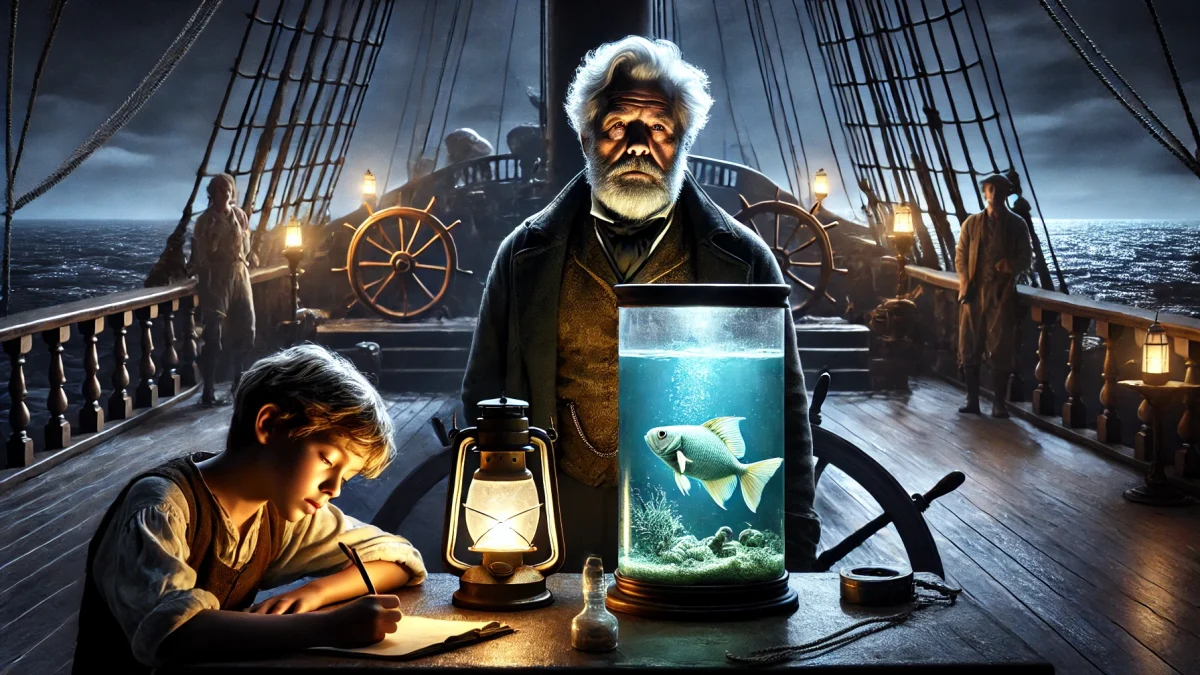※カラフル対訳で紹介している作品はすべてパブリックドメインです。
このサイトで使われている作品のすべては著作権の切れた名作などの全文を電子化して、インターネット上で公開しているProject Gutenberg(プロジェクト・グーテンベルク)、LibriVox(リブリヴォックス、朗読図書館)の作品を出典としています。
翻訳者:satoyayo4080
WELL, now that he was started once more upon his old hobby of the shellfish languages, there was no stopping the Doctor. He worked right through the night.
さて、先生がかつての楽しみだった貝の言葉に再び着手すると、先生を止めることは誰にもできなかった。先生はまさに夜通し働いた。
A little after midnight I fell asleep in a chair; about two in the morning Bumpo fell asleep at the wheel;[ハンドルを握って, 運転して] and for five hours the Curlew was allowed to[~することを妨げない] drift where she liked.
夜半過ぎには私は椅子の上で眠ってしまい、午前2時頃にはバンポも舵を取りながら眠ってしまった。おかげで5時間もの間、ダイシャクシギ号は思いのまま好き勝手な所に漂流されることとなってしまった。
But still John Dolittle worked on, trying his hardest to understand the fidgit’s language, struggling to[懸命に~しようとする] make the fidgit understand him.
それでもまだジョン・ドリトル先生は研究を続け、何とかフィジットの言葉を理解しようと、またフィジットに自分の言葉を理解してもらおうと必死になって取り組んだ。
When I woke up it was broad[〈光など〉広く注がれた] daylight again.
私が目が覚めた時は再び真っ昼間でした。
The Doctor was still standing at the listening-tank, looking as tired as an owl[night owl =夜更かしする人] and dreadfully[ものすごく] wet.
先生はまだ「言葉を聴き取るための水槽」の所に立っていて、(夜更かしをした)フクロウのように疲れていて、びしょびしょになっていた。
But on his face there was a proud and happy smile.
しかし、その顔には誇らしげで幸せそうな笑顔が浮かんでいた。
“Stubbins,” he said as soon as he saw me stir, “I’ve done it. I’ve got the key to the fidgit’s language.
「スタビンズ君」と先生は私がちょっと動くとすぐに言った。「やったよ。フィジットの言葉の手がかりをつかんだよ。
It’s a frightfully[恐ろしく] difficult language—quite different from anything I ever heard.
驚くほど難しい言葉だ。今まで耳にしてきたものとはまったく異なっている。
The only thing it reminds me of[思い出させる]—slightly—is ancient Hebrew. It isn’t shellfish; but it’s a big step towards it.
微かに唯一似ているのは古代ヘブライ語だ。それは貝類の言葉ではないが、それに向かう大きな一歩だ。
Now, the next thing, I want you to take a pencil and a fresh notebook and write down everything I say.
さぁ、次にやってもらいたいのは、鉛筆と新しいノートを持ってきてもらい、わしが言うことすべてを書き取って欲しい。
The fidgit has promised to tell me the story of his life. I will translate it into English and you put it down in the book. Are you ready?”
フィジットは、私に身の上話をしてくれると約束をしたんだ。私はそれを英語に翻訳するから、君はそれをノートに書き取【る】って欲しい。準備はいいかな?」
Once more the Doctor lowered[~を押さえる] his ear beneath[~の下に] the level of the water; and as he began to speak, I started to write. And this is the story that the fidgit told us.
もう一度、先生は水面下に耳を押し付けた。先生が話し始めると、私は(その言葉を)書き始めた。これはフィジットが私たちに語った物語です。
THIRTEEN MONTHS IN AN AQUARIUM
“I was born in the Pacific Ocean, close to the coast of Chile. I was one of a family of two-thousand five-hundred and ten.
水族館の13ヶ月間
「僕はチリの海岸に近い、太平洋で生まれました。2,510匹の家族の一匹でした。
Soon after our mother and father left us, we youngsters got scattered. The family was broken up—by a herd of[群れ] whales who chased us.
お母さんとお父さんが僕らから離れてすぐに、僕ら若者は散り散りになりました。家族はクジラの群れに追いかけられながらバラバラになったのです。
I and my sister, Clippa (she was my favorite sister) had a very narrow escape[間一髪] for our lives.
僕と妹のクリッパは(彼女は僕の好きな妹だった)命からがら何とか逃げました。
As a rule,[概して, 一般に] whales are not very hard to get away from if you are good at dodging[ひらりと身をかわす]—if you’ve only got a quick swerve.[急に向きを変える]
たいていは、うまくかわして、すばやく向きを変えさえすればクジラから逃げるのはそんなに難しくはありません。
But this one that came after Clippa and myself was a very mean whale.
でもクリッパと僕を追いかけてきたのは、とても意地悪なクジラでした。
Every time he lost us under a stone or something he’d come back and hunt and hunt till he routed us out into the open again.
石の下などで(僕たちを)見失うたびに、また戻ってきて、再び外に引きずり出すまで探し続けたんです。
I never saw such a nasty,[(胸が悪くなるほど)いやな] persevering[辛抱強い, 根気の良い] brute.[けだもの, 畜生]
あんなに厄介でしつこい野郎は見たことがありません。
“Well, we shook him at last—though not before[(ようやく振り払った)~しかしその前に] he had worried us for hundreds of miles northward,[北に向かって] up the west coast of South America.
「さて、南米の西海岸から北に向かい何百マイルも北上して、僕らを悩まし続けたクジラをようやく振り払ったんですが、
But luck was against us that day.
その日はついていませんでした。
While we were resting and trying to get our breath, another family of fidgits came rushing by, shouting, ‘Come on! Swim for your lives![生きるために] The dog-fish are coming!’
私たちが休んで息を整えようとしていると、別のフィジット一家が駆け寄ってきて叫んだのです。『こっちに来るんだ!命がけで泳ぐんだ!ツノザメが来るぞ!』
“Now dog-fish are particularly fond of fidgits. We are, you might say,[~と言ってもいい] their favorite food—and for that reason we always keep away from deep, muddy waters.
さて、ツノザメは特にフィジットが大好きなんです。つまり、僕らは、彼らの好物の食べ物なんです。だから、僕たちはいつでも深くて濁った海には近づかないようにしているんです。
What’s more, dog-fish are not easy to escape from; they are terribly fast and clever hunters. So up we had to jump and on again.
しかも、ツノザメは恐ろしいほど速く、賢いハンターなので、簡単には逃げられないんです。だから、僕らは何度も跳ねあがり続けて逃げなければいけません。
“After we had gone a few more hundred miles we looked back and saw that the dog-fish were gaining on[追い迫る] us.
数百マイルも泳いだ後、振り返ってみるとツノザメが僕たちに迫ってきていました。
So we turned into[進路を~へ向ける] a harbor. It happened to be[偶然~だった] one on the west coast of the United States.
だから、僕たちは波止場に逃げ込みました。そこは、たまたまアメリカの西海岸でした。
Here we guessed, and hoped, the dog-fish would not be likely to follow us.
ここならツノザメも追ってくることはないだろうと思いましたし、そう願いました。
As it happened, they didn’t even see us turn in,[(大通りから)中に入ってくる] but dashed on[突進する] northward and we never saw them again.
折よく、やつらは僕らが(波止場に)逃げ込んだことに気づかず、北に向かって行ってしまい、それからは二度と見かけていません。
I hope they froze to death in the Arctic Seas.
北極海で凍死してくれればいいのですが。
“But, as I said, luck was against us that day.
でも、さっき僕が言った通り、その日は運が悪かったのです。
While I and my sister were cruising[巡航する] gently round the ships anchored in the harbor looking for orange-peels, a great delicacy with us—Swoop! Bang!—we were caught in a net.
僕と妹が、港に停泊している船の周りを静かに漫遊しながら大好物であるオレンジの皮を探していると、スゥーッ!バーン!網につかまってしまいました。
“We struggled for all we were worth; but it was no use. The net was small-meshed and strongly made.
僕らは必死でもがいたけど、無駄でした。網は目が小さく丈夫に出来ていました。
Kicking and flipping[ぽんと打つ,はじく] we were hauled up the side of the ship and dumped down on the deck, high and dry in a blazing noon-day sun.
蹴飛ばしたり、叩いたりしているうちに、僕らは船の横に引きずりあげられ、昼下がりの太陽に照らされカラカラに乾いた高い甲板の上に投げ降ろされました。

